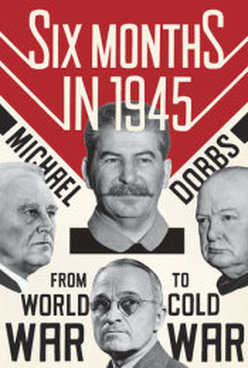Six Months in 1945
|
REVIEWS
"Superbly evocative and readable...filled with telling details." San Francisco Chronicle.
"Superb...Dobbs tells the story with the precision of a fine historian and the verve of a first-rate journalist." Dallas News. "A gifted storyteller and thorough researcher with an eye for detail...tension and suspense aplenty." Washington Times "Elegantly written...Dobbs delivers engaging portraits of the national leaders...A confident and rewarding survey of a hinge point in 20th century history." Kirkus Reviews. "Michael Dobbs tells this story with panache, lucidity, and exceptional scholarship."--Rick Atkinson, Amazon.com "Dobbs brings these 'six months in 1945' to life better than anyone before him. In brisk, engrossing chapters, he weaves between the Big Three decision-makers...and sketches their stratagems, illusions, strengths and weaknesses."--Military Book Club. "Dobbs delivers a propulsive read, replete with the sort of telling details that bring his subjects into high resolution. There are stretches of Six Months in 1945 that read like a taut World War II thriller."--Barnes and Noble essay." MAPS AND PHOTOS
Berlin and Potsdam in July 1945. AUTHOR Q AND A "I am interested in hinge moments in history, the time when one era ends and another begins." |
|
|
